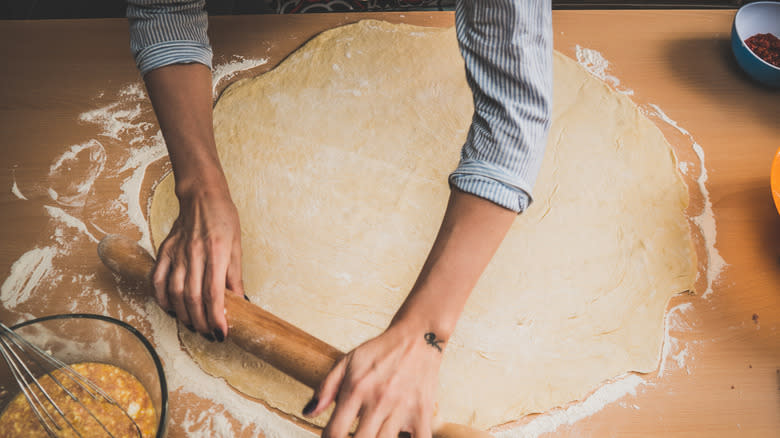What Is The Best Type Of Rolling Pin To Use For Puff Pastry?

In baking, you not only have to find the right ingredients for your chosen recipe, but you also have to find the right rolling pin for your chosen dough. Although they may seem like a one-size-fits-all tool, they actually come in a bunch of shapes and sizes. Your choice of rolling pin can impact the final structure and texture of your chosen pastry. When making pie crust, for instance, a French rolling pin is your best bet for a controlled, evenly rolled dough. For puffy pastry, however, you'll want to think twice before grabbing anything wooden. Instead, you should opt for a durable, marble rolling pin — an option strong enough for even the coldest of pastry doughs.
To understand why a marble rolling pin is so crucial, take a look at the process of making puff pastry. The dough forms a base across recipes like apple strudel, pinwheels, and onion tarts. Each of these foods is defined by flaky layers — best achieved by chilling your dough in stages. Yet because the dough is cold, it can often prove difficult to work with. It therefore requires a durable, heavy-duty tool for rolling.
Enter: a marble rolling pin, which proves strong enough for the job. The heavy variation won't absorb fat or moisture from your dough and can, instead, flatten it with ease. There's one step to consider, however, before you break out your rolling pin. You'll not only want to control the strength of your tool but also, importantly, its temperature.
Read more: 30 Types Of Cake, Explained
Chill Your Marble Rolling Pin To Prevent Sticking

A chilled dough requires a chilled rolling pin — and a little bit of forethought. Before it comes time to roll out your dough, simply pop your marble rolling pin inside the refrigerator or freezer. You don't need more than 20 minutes. You'll just want to leave enough time for the rolling pin's surface to chill. That way, you ensure the tool stays cold enough for your puff pastry. Meaning you don't need to worry about ruining your carefully layered dough with anything too warm. Plus, the chilling stage will also make the rolling process easier, as you minimize the risk of your pin sticking to your dough.
As for how, exactly, to roll out your pastry, the process is fairly intuitive. The weight of the rolling pin will do most of the work for you, allowing you to press and shape your dough as necessary. Good news for anyone who doesn't want baking to become an arm workout — you, hopefully, won't need to apply too much force to your rolling pin. Instead, the marble will roll out your pastry with ease, so you won't have to wait long before using the oven.
Read the original article on Tasting Table.


